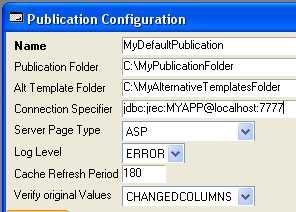|
See
Also
A publication configuration
has a number of publication attributes. When pages are published,
the attribute values are substituted in published files. These
publication attributes are:

|
·
|
The Publication Folder
specifies the folder in which all files will be published. |
|
·
|
The optional Alt(ernative) Template Folder specifies an
alternative location where CSS style sheets, images, and scripts
can be stored. During publication, all files in the publication
folder are overwritten, so the alternative template folder provides
a safe location for files that you have changed and wish to keep.
See The Alternative
Template Folder for more details. |
|
·
|
The Connection
Specifier specifies the JDBC connection string with which
the USoft Page Engine connects to the Rules Service. It has
format: |
jdbc:jrec:<APPLICATION>@<COMPUTER
NAME>:<PORT NUMBER>
For example:
jdbc:jrec:TRAVEL@localhost:7777
|
·
|
The Server Page Type
specifies whether ASP server pages (default), JSP server pages, or
ASP.NET server pages are generated. |
|
·
|
The Log Level attribute
specifies the information logged in the log file: |
|
·
|
NOLOG specifies that no logging takes place. |
|
·
|
ERROR (default) specifies that only errors will be written in
the log subfolder. |
|
·
|
INFO specifies that also the appropriate Combined.xml file
(generated by the Page Engine before it is transformed by the XSL
transformations) is written. |
The INFO setting is advised
in a development environment, ERROR is advised in the production
environment for performance reasons.
|
·
|
DEBUG specifies that all requests to a Rules Engine are
logged. |
|
·
|
For performance reasons, the USoft Page Engine caches the
combination of each user and first menu page. The Cache Refresh Period attribute
specifies the amount of time in seconds after which this cache is
always refreshed. The default is 180 (seconds). Note that when the
USoft Page Engine is shut down, the cache is also automatically
refreshed. The first time the user credentials are checked, the
cache is not used. If this attribute is set to -1, menus are
refreshed on each call. If set to 0, menus are refreshed only on
the first call. |
Do not confuse this cache
refresh period attribute with the resource name with the same name
used by the the Rules Engine to specify the refresh period for all
authorization data. This setting is described in the Authorizer
help.
|
·
|
When sending a SQL statement to the Rules Service, the Page
Engine uses an 'INVOKE xml.import' statement. The Verify original Values attribute
specifies whether you want the Rules Engine to check whether the
original values are checked (whether the data manipulated has not
already been changed). |
Allowed values are: NO (no
check), ALLCOLUMNS (all columns of the manipulated record are
checked), and CHANGEDCOLUMNS (default - only columns that are
changed are checked).
|

